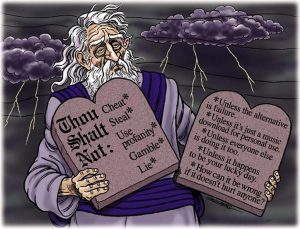God decides
Catchphrases and slogans are found in virtually every aspect of daily life. Marketers know that a successful catchphrase or slogan, repeatedly uttered, can propel a product or service beyond any normal expectations. Sometimes a catchphrase mirrors prevailing sentiment to such a degree that it transcends well beyond its age and its original intent, such as “These are the times that try men’s souls.”[1]

Thou shalt not … whatever!
These clearly are times that should try the soul, surrounded by evil of every form of pestilence and permutation that are virulently and violently attacking those who would disagree or fail to accept evil’s self-defined tenets and doctrine. Yet evil beguiles the good with enticements which are but illusions, preying on our vulnerabilities and our weaknesses until we find ourselves caught in its web of lies, deluded into believing that we are beyond redemption, supported by our own disordered sense of worthlessness and failure.
Most of us, thankfully, never fall so near the fires of hell, yet none are immune from evil’s allurements “for all have sinned and are deprived of the glory of God.”[2] We are all sinners and there is no inoculation to permanently immunize ourselves to sainthood. Yet we can take preventive measures by seeking forgiveness and asking for God’s grace to combat our sinful tendencies.
What we often deflect from conscious thought is the notion that every sin, no matter how small or how great its consequence, is by its nature an evil act. Hidden behind the lens of altruistic intent, the sinner justifies the sinful act as a good, ignoring the intrinsic evil nature of it. Every sin fractures our relationship with God and serves to tighten the noose of evil. As our relationship with God is weakened, so is our reliance on his love and grace. All too soon we simply turn our hearts and minds away from God and look to ourselves for answers.
“Once the idea of a universal truth about the good, knowable by human reason, is lost, inevitably the notion of conscience also changes. Conscience is no longer considered in its primordial reality as an act of a person’s intelligence, the function of which is to apply the universal knowledge of the good in a specific situation and thus to express a judgment about the right conduct to be chosen here and now. Instead, there is a tendency to grant to the individual conscience the prerogative of independently determining the criteria of good and evil and then acting accordingly. Such an outlook is quite congenial to an individualistic ethic, where in each individual is faced with his own truth, different from the truth of others. Taken to its extreme consequences, this individualism leads to a denial of the very idea of human nature.”[3]
Ultimately it is this denial of the right nature of man that sits at the foot of the altar of evil and leads to the relativistic and subjective moral choices we are want to make. What is good and what is evil (sin) are moral decisions outside of the purview of man. Only God can consider something a sin; no religion, church, group, or individual owns that power. Objective morality confines the matter of good and evil to God’s eyes, certainly not to man’s.
To be continued.
[1] Thomas Paine, The Crisis, December 23, 1776.
[2] Rom 3:23.
[3] Pope Saint John Paul II, Veritas Splendor, Encyclical Letter, §32, August 6, 1993.
